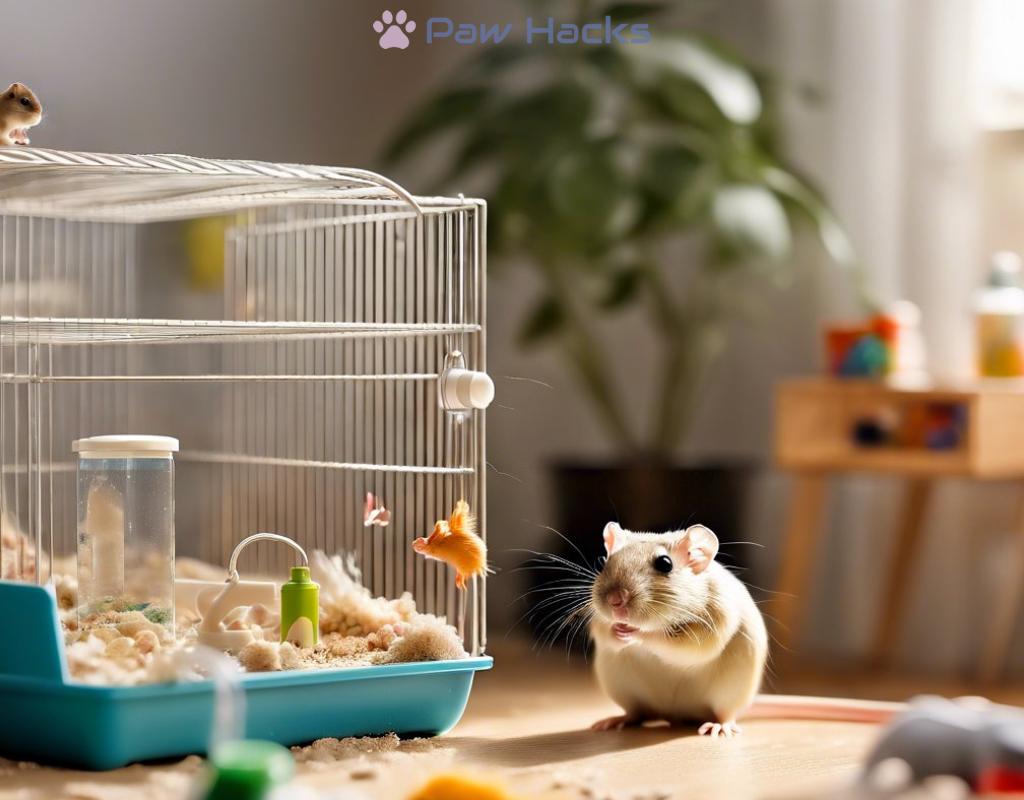Cleaning a Gerbil’s Cage
Essential Steps for a Sparkling Clean Gerbil Cage
Keeping your gerbil’s cage clean is not just about aesthetics; it’s crucial for your pet’s health and happiness. A clean cage helps prevent the buildup of harmful bacteria, reduces odors, and ensures your little friend has a safe and comfortable living space. With the right approach, cleaning your gerbil’s cage can be a straightforward and rewarding task.
Before diving into the cleaning process, it’s essential to have all the necessary supplies at hand. This will streamline your efforts and ensure you don’t miss any important steps. Here’s a handy list of items you’ll need:
- Fresh bedding material
- Non-toxic cage cleaner or a vinegar solution
- Soft sponge or cloth
- Brush (for stubborn spots)
- Bucket for waste disposal
- Gloves (optional)
Now that you have your supplies ready, it’s time to get started. Follow these essential steps for a thorough cleaning:
- Remove Your Gerbil: Safely transfer your gerbil to a temporary habitat, such as a travel cage or a secure box, while you clean.
- Empty the Cage: Take out all toys, food dishes, and water bottles. Discard any old bedding and waste into your bucket.
- Wash the Cage: Using your non-toxic cleaner or a vinegar solution, wipe down the entire cage, including the bottom and walls. Rinse thoroughly to remove any cleaning residue.
- Scrub Accessories: Clean all toys and accessories with warm soapy water. Rinse well and let them dry completely.
- Add Fresh Bedding: Once the cage is dry, add a generous layer of fresh bedding for your gerbil to burrow in.
- Reintroduce Your Gerbil: Place the cleaned toys and accessories back into the cage, then gently return your gerbil to its sparkling clean home.
Choosing the Right Cleaning Supplies for Your Gerbil’s Home
When it comes to maintaining a healthy environment for your gerbil, selecting the right cleaning supplies is paramount. Not all cleaning products are created equal, and some may contain harsh chemicals that could be harmful to your furry friend. Thus, it is essential to make informed choices to ensure your cleaning routine is effective yet safe. The right supplies not only help in achieving a clean cage but also contribute to the overall well-being of your pet.
Understanding the Importance of Non-Toxic Options
Choosing non-toxic cleaning supplies is crucial for the safety of your gerbil. Many standard cleaning agents contain chemicals that can cause respiratory issues or skin irritations in small animals. Instead, opt for natural alternatives such as a vinegar solution. Vinegar is an excellent disinfectant and deodorizer while being safe for your pet. Moreover, it is readily available, making it an economical choice.
Evaluating Bedding Materials and Accessories
The bedding you select plays a vital role in your gerbil’s comfort and hygiene. It’s recommended to use bedding made from safe materials like aspen shavings or paper-based products. Avoid cedar or pine shavings, as they can emit harmful oils that may affect your gerbil’s health. Additionally, when cleaning accessories such as food dishes and toys, stick to items that can withstand gentle scrubbing without breaking down. A soft sponge paired with warm soapy water is typically sufficient for most accessories. This not only ensures cleanliness but also prolongs the life of your gerbil’s favorite items.
Assessing Effectiveness and Environmental Impact
It’s not just about cleaning; it’s about how you clean. The effectiveness of your supplies can significantly impact how often you need to clean the cage. Products that are biodegradable and environmentally friendly are excellent choices as they lessen your ecological footprint while caring for your pet. When assessing the effectiveness of cleaning supplies, consider how well they eliminate odors and bacteria without leaving harmful residues behind.
How Often Should You Clean Your Gerbil’s Cage? A Complete Guide
Understanding the Cleaning Frequency
Establishing a regular cleaning schedule for your gerbil’s cage is essential for maintaining a healthy living environment. Gerbils are naturally active creatures, and their habitat can become messy quickly. So, how often should you take time out of your busy schedule to clean their home? This guide will provide insights into the optimal cleaning frequency to ensure your furry friend stays happy and healthy.
Daily, Weekly, and Monthly Cleaning Routines
To make the cleaning process manageable and effective, it’s helpful to break down the tasks into daily, weekly, and monthly routines. Each of these routines plays a vital role in keeping your gerbil’s cage in tip-top shape.
- Daily Tasks: Every day, you should check for and remove any uneaten food, droppings, or wet spots. This practice helps minimize odors and prevents the buildup of harmful bacteria.
- Weekly Clean-Up: Once a week, empty the cage completely and replace about 50% of the bedding. This allows your gerbil to maintain some familiar scents while introducing fresh bedding. It’s also a good time to wash food dishes and water bottles thoroughly.
- Monthly Deep Clean: A comprehensive cleaning should take place monthly. This involves removing all bedding, scrubbing the cage with a safe cleaner, cleaning all accessories, and replacing them with fresh bedding.
Tailoring Your Cleaning Schedule
While the general guidelines above are effective for most gerbil owners, each pet’s needs may vary. Factors such as the size of the cage, the number of gerbils, and the type of bedding used can all influence how often you should clean. For example, if you have multiple gerbils, you may need to clean more frequently due to increased waste production.
| Factor | Cleaning Frequency |
|---|---|
| Single Gerbil | Weekly for deep clean, Daily for spot cleaning |
| Multiple Gerbils | Twice a week for deep clean, Daily for spot cleaning |
| Large Cage | Every 10 days for deep clean, Daily for spot cleaning |
| Small Cage | Weekly for deep clean, Daily for spot cleaning |
By tailoring your cleaning schedule to the specific needs of your gerbil, you can ensure a hygienic and comfortable environment for your pet. Remember, regular cleaning not only promotes health but also enriches the overall happiness of your furry companion.
Tips for Keeping Your Gerbil Cage Smelling Fresh and Hygienic
Maintaining a fresh and hygienic environment in your gerbil’s cage is vital for the overall well-being of your pet. Not only does a clean habitat contribute to your gerbil’s health, but it also makes for a more pleasant experience for you as an owner. The following tips will help you ensure that your furry friend enjoys a cage that is both odor-free and comfortable.
Smart Bedding Choices for Odor Control
The type of bedding you choose can significantly impact the smell of your gerbil’s cage. Opt for bedding materials that have natural odor-absorbing properties. Materials like aspen shavings or paper-based bedding are excellent choices, as they help reduce odors while providing comfort for your pet. Avoid bedding made from cedar or pine, which can release harmful oils and contribute to unpleasant smells.
Routine Maintenance for a Fresh Environment
Staying consistent with your cleaning routine is key to keeping your gerbil’s cage smelling fresh. In addition to your regular cleaning schedule, consider incorporating some quick daily tasks. These include removing uneaten food and droppings to prevent odors from accumulating. Furthermore, regularly spot-cleaning wet areas can go a long way in maintaining a fresh scent.
In addition to cleaning, you might also want to consider placing an open container of baking soda in a corner of the cage. This natural deodorizer helps absorb any lingering odors without posing any risk to your pet. Just make sure to avoid placing it directly in areas where your gerbil can dig it up.
Fresh Air and Ventilation
Providing adequate ventilation is another essential factor in keeping your gerbil’s cage smelling pleasant. Make sure the cage is placed in a well-ventilated area, allowing fresh air to circulate. If possible, spend some time each week cleaning the area around the cage to eliminate any residual odors from the surrounding environment. A clean space contributes to a hygienic atmosphere for your pet, as well as for you.
By combining these strategies—choosing the right bedding, maintaining a consistent cleaning schedule, and ensuring proper ventilation—you can create a fresh and inviting habitat for your gerbil. Not only will this enhance your pet’s quality of life, but it will also make your experience as a gerbil owner much more enjoyable.
Troubleshooting Common Cleaning Challenges in Gerbil Care
Confronting Odor Issues Head-On
One of the most common challenges gerbil owners face is managing unpleasant odors that can arise from a messy cage. No one wants their home to smell like a pet store, so it’s crucial to understand the underlying causes of these odors. Often, the source can be traced back to neglected waste or inadequate bedding. Even with a regular cleaning routine, persistent smells may linger if the bedding isn’t absorbing moisture effectively. If you find yourself battling odors, consider switching to a more absorbent bedding material, like aspen shavings or specially formulated paper bedding. These options not only help control odors but also ensure a comfortable environment for your pet.
Another strategy is to incorporate daily spot-cleaning into your routine. By removing droppings and uneaten food promptly, you’ll significantly reduce any odor buildup. If you notice that odors still persist despite your best efforts, it may be time to reevaluate your cleaning supplies. Make sure you are using non-toxic cleaners that effectively eliminate bacteria without leaving harmful residues behind.
Dealing with Stubborn Stains and Residues
Accidents happen, and gerbils can sometimes cause tough stains in their cage. Whether it’s caused by spilled food or a wet spot that has seeped into the corners, these stains can become a hassle to remove. A gentle scrub with a soft sponge and a safe cleaner can often do the trick. For those particularly stubborn stains, consider using a vinegar solution mixed with water. This natural cleaner is effective and safe for your pet. Remember, the key is to be consistent with your approach, as letting stains sit for too long can make them more difficult to remove.
If you find that traditional cleaning methods just aren’t cutting it, consider investing in a pet-safe enzyme cleaner. These specialized products break down organic materials, making the cleaning process even more efficient. Always ensure that the cage is thoroughly rinsed and dried after cleaning to prevent any residue that could irritate your gerbil’s sensitive respiratory system.
Managing Cage Maintenance Time Effectively
For many busy pet owners, maintaining a clean gerbil cage can feel like a daunting task. However, effective time management can make this process much more manageable. Start by setting aside a specific day each week dedicated to deep cleaning. It’s helpful to make this a part of your routine, similar to other household chores. You might also find it useful to prepare a checklist to streamline your cleaning process. This way, you can ensure that no important steps are overlooked.
Consider coordinating your cleaning schedule with other household tasks to maximize efficiency. For instance, if you plan to vacuum the room where your gerbil resides, do the cage cleaning right before to keep the area tidy. Additionally, take advantage of the time spent cleaning to engage with your gerbil; they can enjoy some time outside the cage while you refresh their home. This dual approach not only ensures a clean environment but also strengthens your bond with your little friend.
Share this content:



